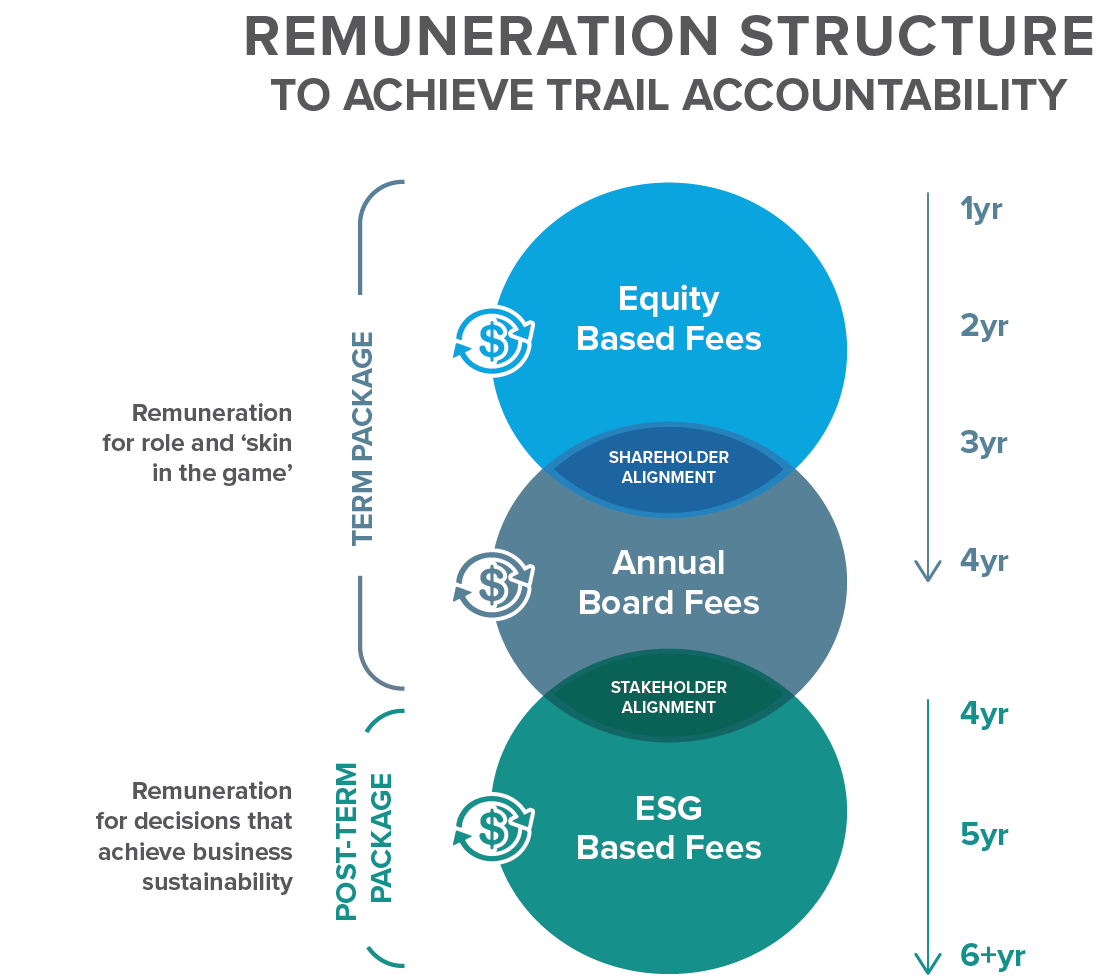The reporting landscape has changed, and stakeholder focus on ESG performance is only growing. And, while most listed companies now have governance structures and processes in place to ensure board oversight of operational ESG issues and targets, it is questionable whether existing equity instruments for ESG measures are adequate.
It is no longer good enough for directors to think about profit and reputation, the key is ESG and what is happening between the organisation and the community. As such, and increasingly so, more organisations are looking to link executive reward structures with ESG - tying it to annual bonuses or long-term incentives.
But, with good governance prescribing that non-executive directors (NEDs) are incentivised independently from executive management, we still see little to no linkage between board and executive ESG metrics. ‘Will they get to net-zero and by what date?’, ‘will they achieve a more diverse workforce or board?’ or ‘will they reduce emissions?’; are just some examples of current metrics seen in the ESG agenda. With this thinking in play, how can companies assure investors of a balanced and transparent rationale for the NED remuneration package?
Companies should explain how ESG issues could affect financial performance and how this is reflected in long term incentive plans.
What’s hindering meaningful reward of NEDs who achieve a company’s ESG goals?
For most board members, the average term of service is three years. This causes issues when linking ESG performance and non-executive incentives where the vesting term of those measures would typically take longer than three years to convert.
So, if the board and executive management are there to ensure that the company has a sustainable platform to ensure long-term shareholder value how do we ensure the wellbeing of the business is not compromised for short-term gains? The alignment between board and executive management has to exist.
What if there was a long-term equity instrument for NEDs that catered to long-term ESG measures?
Introducing a long-term equity instrument for ESG measures in non-executive pay - with say a 5-7 year vesting term and cascading incentives for executives - would enable companies to show that they were serious about managing their social and economic impacts.
Imagine how incentivising both the board and executive management with a whack of incentives accessible seven years in the future could change decision making during their term of service. This would not only drive a board to think beyond the shareholder but to the broader business stakeholders and longer-term business sustainability - which is very different to now, where the board is focused more on shareholder expectations and profitability.
Figure 1: A possible non-executive remuneration package to incorporate long term equity instruments for ESG (click to enlarge)
In addition, NED remuneration should include stakeholder alignment of which shareholders are just one part of that bundle. A sure way to achieve stakeholder alignment would be to ensure that the board, management and shareholders are held to long term ESG metrics with trail accountability.
An example of ESG linked remuneration in the carbon neutrality space could include:
Board Level KPIs
- 2 per cent year-on-year emissions reduction until 2030, of net greenhouse gas emissions compared with the 2015 baseline 100,000 CO2-e.
- 3 per cent annual reduction in operational greenhouse gas emissions intensity until 2040, compared with the 2017-18 facility baseline 15 t CO2-e per tonne of hydrogen equivalent production.
- Use 100 per cent renewable energy across operations by 2025.
- Phase out all fossil fuel-based energy sources across operations by 2027.
Executive Level KPIs
- Identify and implement energy efficiency initiatives to reduce overall energy consumption and/or waste.
- Engage and support supply chain vendors to transition towards net zero emissions by 2050.
- Engage with and contribute to research and development to support decarbonisation and emissions reduction strategies with key industry partners.
Why should companies consider an external remuneration consultant to select appropriate ESG metrics and long-term performance measures?
With regulation coming to play in the next 12 months that will push businesses into longer-term thinking – the choice exists to begin work on implementation now.
An external remuneration consultant can add impartial oversight and experience in establishing the right financial metrics, targets and weighting for peer benchmarking. In this pandemic pay era, ESG can determine the fabric of the company culture, where rates and rewards are at record highs and individuals are more likely to be chasing short-term gains - this is a matter that deserves due attention and investment.
Importantly, how can ESG align with remuneration if the Board haven’t established an ESG baseline to measure KPIs against? This is where the importance of the skill of the remuneration consultant and their connection to sustainability integration comes in. The selection of an appropriate advisor can have a significant impact on reportable company performance in the short and long term.
BDO’s Remuneration and Reward team work closely with specialist in-house ESG advisors who collaborate on pay and reward structures, strategies, and measurement tools. This unique relationship is proven in our track record of transforming the way boards manage themselves by rewarding individuals who want to do the ‘right thing’ and take a longer focus by using metrics that enable correlation between decision making and sustainability.
For a complimentary consultation on how to attract serious board talent and experience to your executive team, as well as establish a leading NED pay package that creates assurance that your Board and Executives are getting rewarded for doing the right thing in the right way, get in touch.
